Borowe Surname Ancestry ResultsOur indexes 1000-1999 include entries for the spelling 'borowe'. In the period you have requested, we have the following 25 records (displaying 1 to 10): Single Surname Subscription | | | Buying all 25 results of this search individually would cost £120.00. But you can have free access to all 25 records for a year, to view, to save and print, for £100. Save £20.00. More... |
These sample scans are from the original record. You will get scans of the full pages or articles where the surname you searched for has been found. Your web browser may prevent the sample windows from opening; in this case please change your browser settings to allow pop-up windows from this site. The English in France
(1428)
King Henry VI of England (one of the grandsons of Charles VI of France) claimed the throne of France (and quartered the fleurs-de-lis of France with the lions of England on the royal standard) as had his predecessors since Edward III, as descendants of Philip IV of France. The English had real power or influence in Brittany, Normandy, Flanders and Gascony, and actual possession of several coastal garrisons, in particular Calais, where the French inhabitants had been replaced by English. Henry VI came to the throne only seven years after his father had trounced the French at Agincourt; but his cousin, Charles VII, who became king of France in the same year, spent his long reign rebutting the English king's claim to his throne by territorial reconquest and consolidation. The English administration kept a series of records called the French Rolls. On these are recorded royal appointments and commissions in France; letters of protection and safe-conduct to soldiers, merchants, diplomats and pilgrims travelling to France from England and returning, and to foreign legations. There are also licences to merchants to export to the Continent, and to captains to transport pilgrims. As Henry VI's reign progressed, and the English grip on northern France loosened, the French Rolls also increasingly include entries concerning the ransoming of English prisoners.BOROWE. Cost: £6.00.  | Sample scan, click to enlarge
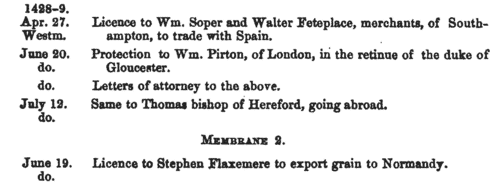
| The English in France
(1435)
King Henry VI of England (one of the grandsons of Charles VI of France) claimed the throne of France (and quartered the fleurs-de-lis of France with the lions of England on the royal standard) as had his predecessors since Edward III, as descendants of Philip IV of France. The English had real power or influence in Brittany, Normandy, Flanders and Gascony, and actual possession of several coastal garrisons, in particular Calais, where the French inhabitants had been replaced by English. Henry VI came to the throne only seven years after his father had trounced the French at Agincourt; but his cousin, Charles VII, who became king of France in the same year, spent his long reign rebutting the English king's claim to his throne by territorial reconquest and consolidation. The English administration kept a series of records called the French Rolls. On these are recorded royal appointments and commissions in France; letters of protection and safe-conduct to soldiers, merchants, diplomats and pilgrims travelling to France from England and returning, and to foreign legations. There are also licences to merchants to export to the Continent, and to captains to transport pilgrims. As Henry VI's reign progressed, and the English grip on northern France loosened, the French Rolls also increasingly include entries concerning the ransoming of English prisoners.BOROWE. Cost: £6.00.  | Sample scan, click to enlarge
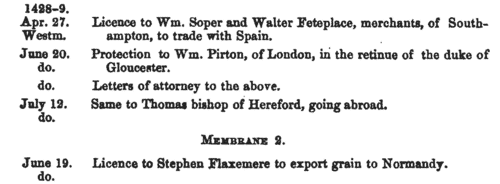
| Clergy, the religious and the faithful in Britain and Ireland
(1471-1484)
These are abstracts of the entries relating to Great Britain and Ireland from the Lateran and Vatican Regesta of pope Sixtus IV. Many of these entries relate to clerical appointments and disputes, but there are also indults to devout laymen and women for portable altars, remission of sins, &c. This source is particularly valuable for Ireland, for which many of the key government records of this period are lost. Many of the names in the text were clearly a puzzle to the scribes in Rome, and spelling of British and Irish placenames and surnames is chaotic. Sixtus IV was consecrated and crowned 25 August 1471 (the day from which his pontificate is dated) and died at Rome 12 August 1484. The extracts were made by J. A. Twemlow from Vatican Regesta dxlvi to dclxxxi and Lateran Regesta dccxiii to dcccxxxviii, and published in 1955. Not all the Lateran registers survive from this pontificate, but were still in existence in the 18th century, when indexes were compiled giving rubricelle, or brief summaries of the papal bulls; nor, indeed, have all these indexes now survived, but Twemlow added an appendix listing all the rubricelle relating to the British Isles extant for the reign of Sixtus IV.BOROWE. Cost: £4.00.  | Sample scan, click to enlarge

| Patent Roll 1 Henry VIII
(1509-1510)
Royal grants of all kinds were enrolled on the Patent Rolls of England. Many of these grants originated as signed bills (S. B.) or privy seals (P. S.). J. S. Brewer calendared the rolls for the first year of the reign of king Henry VIII (22 April 1509-21 April 1510) for the Master of the Rolls, including all the surviving signed bills and privy seals (some of which had never led to enrolment), in this volume published in 1862. We have reindexed this: most of the names that occur are of those granted royal offices, or wardships or ecclesiastical preferments that were in the hands of the Crown, and often the names of those whom they superseded. BOROWE. Cost: £6.00.  | Sample scan, click to enlarge
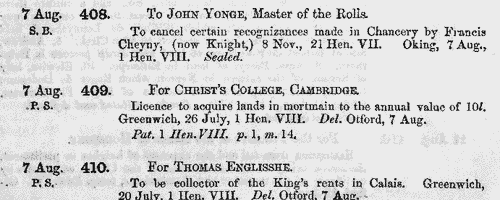
| Kent Charters
(1510-1519)
A large accumulation of documents preserved in the Bodleian Library, Oxford, formerly constituted the antiquarian collections of Anthony a Wood, Roger Dodsworth, Ralph Thoresby, Thomas Martin of Palgrave, Thomas Tanner bishop of St Asaph, Dr Richard Rawlinson, Richard Furney archdeacon of Surrey, and Richard Gough. A calendar of these was prepared by William H. Turner and published in 1878 under the title 'Calendar of Charters and Rolls preserved in the Bodleian Library'. The word 'charters' is here used in a very general sense, including virtually any manuscript or copy of a manuscript, but the bulk of the contents consists of mediaeval deeds of conveyance. Turner's calendar deals with each briefly, naming the principal parties and the nature of the deed, but hardly ever lists the witnesses. Many of these charters were undated (dating of deeds did not become standard until around 1350) or so damaged or defective ('mutilated' is Turner's usual description) as no longer to display a legible date. However, he contrived, from the style of the script and/or the nature of the contents, to estimate dates in such cases. The sample scan is from the start of the Bedfordshire list.BOROWE. Cost: £4.00.  | Sample scan, click to enlarge
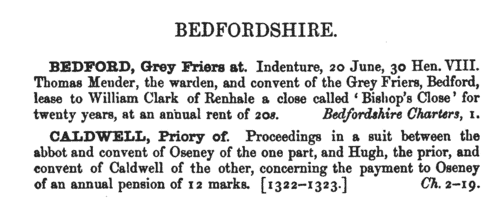
| Taxpayers in Sussex
(1524-1525)
By Act of Parliament of 1523 (14 & 15 Hen. III, c. 16) a general subsidy was raised, spread over four years, from laymen, clergy and peers. In each of the first two years 1s in the £ was raised from annual income from land; 1s in the £ on capital goods worth over £2 and under £20; and a flat payment of 4d on goods worth from £1 to £2, and also by persons aged 16 and upwards in receipt of £1 per annum in wages. In the third year a further shilling in the pound was payable on land worth £50 and upwards a year; and in the fourth year a shilling in the pound on goods worth £50 and upwards. To raise this revenue, returns were required from every hundred, parish or township. In Sussex, the returns for 1524 and 1525 cover the city of Chichester (divided into Estrata, Westrata, Southstrata, North[strata] and Palenta), the borough of Midhurst, and then the rest of the county divided into rapes, within those into hundreds, and within those into boroughs, tithings, liberties, townships or parishes. It is important to note that the cinque ports of Hastings, Rye and Winchelsea were exempt from the subsidy, except for alien inhabitants; and that the town of Westbourne was also exempted 'as the town was lately destroyed by fire'. Aliens are noted as such, sometimes with nationality; and Brighthelmstone (Brighton), which had been burnt by the French in 1514, is only represented fragmentarily. The Sussex Record Society published this transcript and edition by Julian Cornwall of the 1524 and 1525 returns: the 1524 return was used for the main transcript where possible, names peculiar to the 1524 lists being marked with an asterisk, and those with amendments in 1524 with a dagger. At the foot of each 1524 return the new names from 1525 are given. Only the amount of the assessment is printed (m. = marks). Letters prefixed to the sum give the basis of the assessment, no letter (or G) meaning that it was on goods - A, annual wages; D, annual wages of day-labourers; F, fees or salaries of office; L, lands; P, profits; W, wages; x, no basis stated. BOROWE. Cost: £4.00.  | Sample scan, click to enlarge

| Somerset testators and legatees
(1501-1530)
Somerset was almost coextensive with the diocese of Bath and Wells, which exercised local probate jurisdiction through its consistory and archdeaconry courts: but superior to the diocese was the province of Canterbury. Somerset testators who also had property outside the county had their wills proved in the Prerogative Court of Canterbury (PCC). The Somerset Record Society embarked on a program of publishing genealogical abstracts of the registered copy wills of Somerset testators in the PCC archives, and in 1903 (volume xvi) printed abstracts edited by the Reverend F. W. Weaver from the PCC registers 1501-1503 (register Blamyr), 1504-1506 (Holgrave), 1506-1508 (Adeane), 1508-1511 (Bennett), 1511-1514 (Fetiplace), 1514-1517 (Holder), 1517-1520 (Ayloffe), 1520-1522 (Maynwaryng), 1523-1525 (Bodfelde), 1525-1528 (Porch) and 1529-1530 (Jankyn). In addition, the volume includes abstracts of 48 Somerset copy wills in the registers of the Archbishops of Canterbury at Lambeth Palace Library from 1363 to 1491. The heading of each abstract gives the year of making the will (not the year of probate) and the testator's name in bold. Below that is the quire number and name of the PCC register. Date and details of probate are given at the foot of each abstract. Spellings of surnames are preserved as they appear in the registered copy wills, and may vary within a single document.BOROWE. Cost: £4.00.  | Sample scan, click to enlarge

| Inhabitants of Stratford upon Avon in Warwickshire
(1406-1535)
The Hospital of the Holy Cross was founded in 1269; in time this fraternity became a social and religious gild. 'The Register of the Gild of the Holy Cross, the Blessed Mary and St John the Baptist of Stratford-upon-Avon' was edited by J. Harvey Bloom, rector of Whitchurch, and printed in 1907. The register is a record of admissions to the gild, an account of the fines paid by new members, and the names of those in arrear. Each year's record usually starts on the Monday after Ascension Day (the sixth Thursday after Easter), when the new aldermen, master and proctors of the gild were elected, all duly named. Then follow the admissions to the gild, including payments for prayers and candles (lights) for the faithful dead; and the names of the sureties for these payments. Interspersed with this are occasional proclamations and memoranda concerning the fraternity. A peculiarity of this publication is that the years given at the head of each page (e. g. 1502-3) are those of the regnal year (in that case 18 Henry VII) in which the Monday after Ascension Day fell. The regnal years of Henry IV, Henry VI, Richard III and Henry VII all started after that day in the calendars of 1399, 1422, 1483 and 1485; so the gild registers during those years actually cover the following year to that shown in this printed text (in that case, 1503-4).
BOROWE. Cost: £4.00.  | Sample scan, click to enlarge
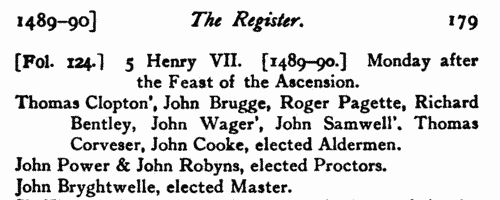
| Tenants of Somerset chantries
(1548)
Chantries were established to perform services for the souls of their founders and other faithful dead, including annual obits and anniversaries at which alms were usually distributed. The chantries could be at an existing altar in a parish church, a new altar in a side chapel of an existing church, in a new chapel in the churchyard or some miles from an existing church: few were founded before 1300, and most date from 1450 to 1500. Hospitals were places provided by similar foundations to receive the poor and weak; there were also religious guilds, brotherhoods and fraternities, and colleges (like large chantries at which three or more secular priests lived in common). An Act of Parliament of 1545 gave king Henry VIII the power to dissolve such chantries, chapels, &c., the proceeds to be devoted to the expenses of the wars in France and Scotland. Commissioners were appointed 14 February 1546 to survey the chantries and seize their property, and in 1548 the commissioners in Somerset produced this survey and rental. The individuals named are the tenants whose rents provided the chantry's income: occasionally an incumbent is named. The survey was edited by Emanuel Green for the Somerset Record Society, and published in 1888.BOROWE. Cost: £4.00.  | Sample scan, click to enlarge

| Retired monks, nuns and chantry priests in the east Midlands
(1547-1551)
Lists of pensions being paid to monks, nuns and chantry priests in the diocese of Lincoln after the dissolution of the monasteries and chantries. The diocese covered Bedfordshire, Buckinghamshire, part of Hertfordshire, Huntingdonshire, Leicestershire and Lincolnshire. Oxfordshire, Northamptonshire and Rutland, which had been shorn from the diocese, are not covered by these returns.
BOROWE. Cost: £6.00.  | Sample scan, click to enlarge

|
Research your ancestry, family history, genealogy and one-name study by direct access to original records and archives indexed by surname.
|












